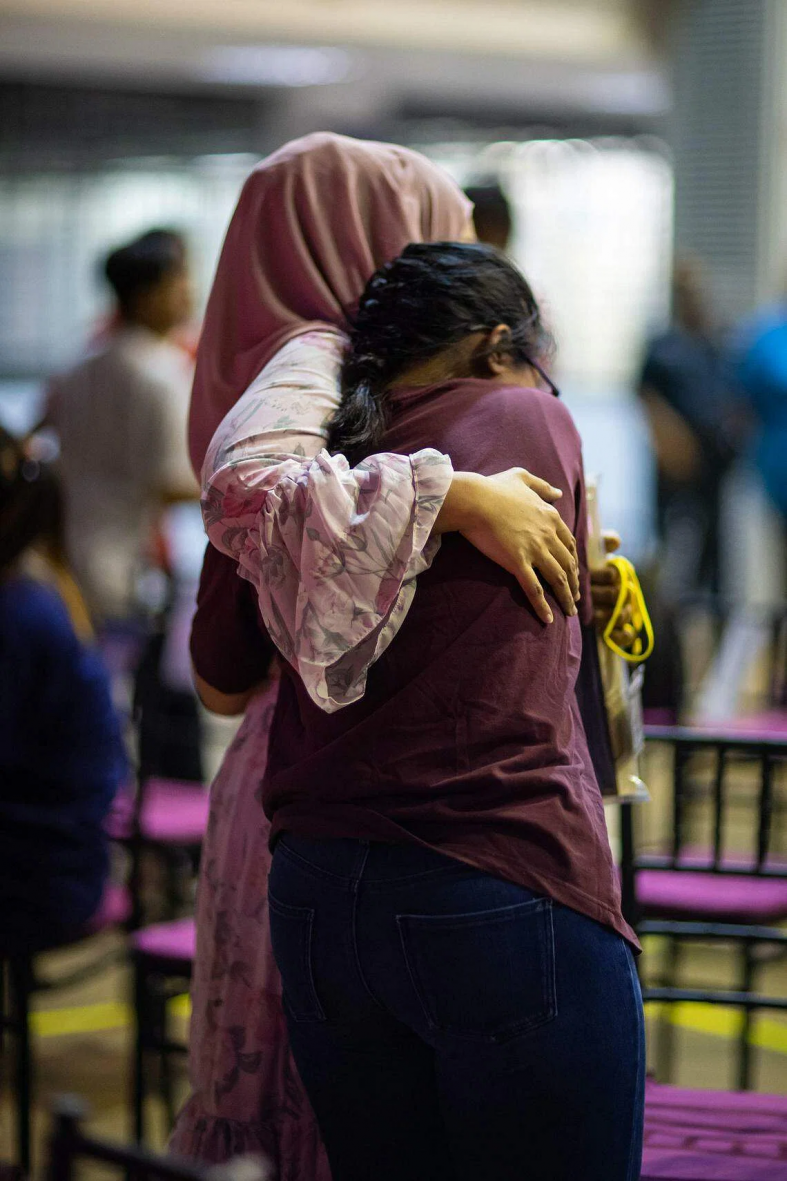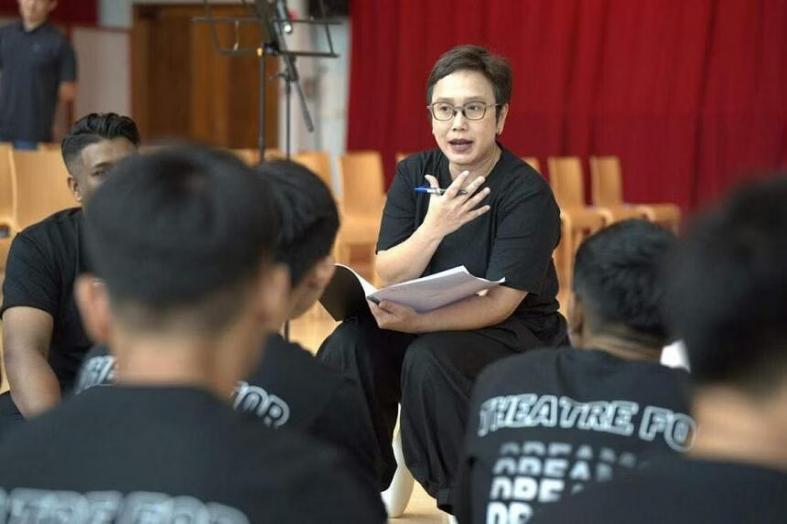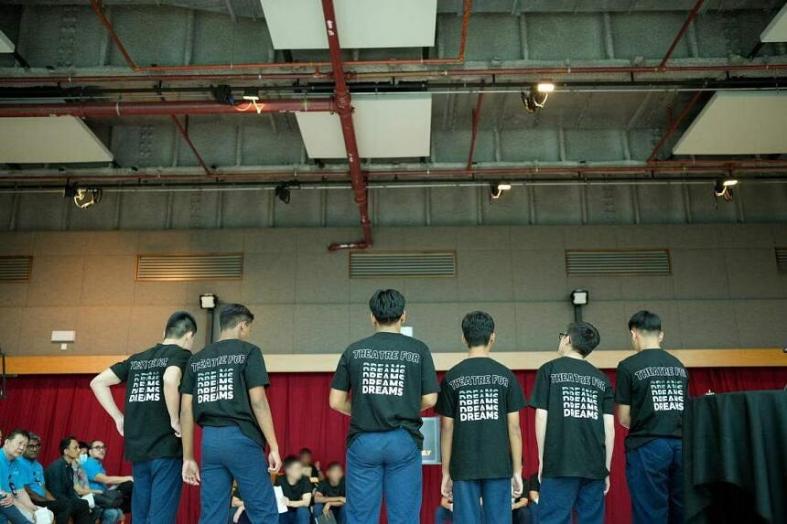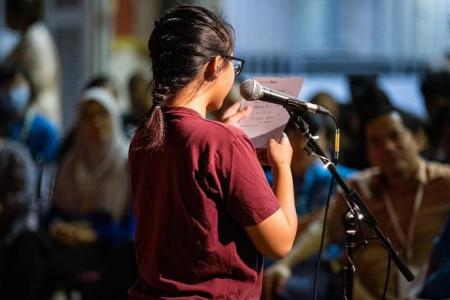‘Forgive me’: Teens from Girls’ Home pen songs to their families
“Assalamualaikum Mama, Papa (Peace be upon you, Mama and Papa), Ni Kakak tau (This is Big Sister),” began a girl’s earnest voice over the plaintive opening chords of a song.
It was a humble affair in the school hall, with fairy lights strung by the wooden stage, but otherwise it was like any other school hall except for the presence of auxiliary police officers.
Parents were gathered in August as part of an annual showcase to watch their daughters perform at the Singapore Girls’ Home. Muted sniffs were heard as the 15 teens shared their songs.
Forgive Me was the result of Anna’s (not her real name) 10-week labour of love from June to August. The 16-year-old who ran away from home multiple times had breached a youth court order to stay in a voluntary children’s home, and her mother had her admitted to the Girls’ Home.
Residents in youth homes, some of whom have committed crimes such as gang involvement and sex offences, go through development and therapeutic programmes, and are taught skills to make changes to their lives. They also receive educational or vocational training to attain qualifications.
Started in 2016 by Esplanade and arts collective Diamonds on the Street, the yearly songwriting programme teaches Singapore Girls’ Home residents songwriting techniques to convey difficult emotions. Close to 100 girls from the home have taken part in the workshop since.
Arts workshops by Esplanade, which include spoken word poetry and theatre workshops, have benefited over 200 youth home residents, including those from the Singapore Boys’ Home.
“Somehow I could not open up through conversation, so I hoped that I could write and sing out my emotions instead for my mum,” said Anna. The teens used the GarageBand app on iPads to come up with the melodies.
“So bring back the old days, where there’s no wall between us,” she sang. “I wish I could tell you how much you mean to me.
“I promise I will change this time, please don’t lose faith in me... I’m sorry for all my mistakes, I don’t mean to hurt you. So forgive me.”
Anna’s birth father had left when she was three, and in the Girls’ Home, she often searched for answers with her case worker.
Anna’s mother, a 34-year-old customer care executive, said she and her daughter drifted apart when Anna got into bad company in secondary school. The teen demanded to have no curfew like her friends, and would act up when she was not allowed this.
“When she was in a strict structured environment (in the Girls’ Home), she mentioned she started to really think about what she has done, how wasted her potential was at that point in time, and she regretted it,” said Anna’s mother, who visits her twice a month.

After the performance, when the girls left their parents to be led by auxiliary officers back to their rooms for lights out at 10pm, Anna was seen sobbing.
Through songwriting, Anna had learnt to express her feelings and control her negativity, anger and frustration, said her mother. “Words like ‘forgive me’ and ‘I love you’ are really tough words for her to say,” she added.
Drama educator Oniatta Effendi, who runs the theatre workshop at the Boys’ Home, said it is uncomfortable for some boys to share personal issues. She has one-on-one chats to understand them better, and she lets them decide whether to attend the next session.
“They want to connect... they want to find the words to say how they feel, but don’t know what the words are,” she said. “It’s the fear of judgment, of prosecution, of people not understanding them, of being seen as selfish.”


Singer-songwriter Crystal Goh, who runs the songwriting workshop, told the girls about her condition, spasmodic dysphonia, which causes her voice to break frequently as the muscles of the voice box go into spasms. “They had a lot of empathy and offered incredible support.”
This encouraged them to open up about their own struggles. But afraid of making spelling and grammar mistakes, some girls were hesitant. Ms Goh had them dictate the lyrics, which she helped them to write down. She also encouraged them to explore writing in their mother tongue.
The girls are paired with volunteers, which gives them a safe space to share about their personal lives.
Ms Goh said one participant found her voice in a song about her wish for her mum to be happy. The girl had been so traumatised after her mother left her family that she was unable to speak.
“It was such a big struggle for her but she had come to a point where she could let go of this... to reconnect....She has made a lot of progress on her journey and she has so much to be proud about.”
In another surprise, a participant from the first run of the programme in 2016 reached out to Ms Goh in 2023.
“It was an act of kindness, an act of love,” she said. “When you’re working with communities, it’s always about planting seeds. Sometimes you don’t really get to see the seed bear fruit.... Sometimes it takes seven years to develop that fruit.”
Joey (not her real name) was 13 when her mother admitted her to the girls’ home for three years. Joey, who committed shop theft, played truant, and came home late after hanging out with friends, was seen to be beyond parental control.
Her father had left when she was young, leaving her mother to raise her and three older siblings alone.
She had failed her Primary School Leaving Examination, and only became angrier and more rebellious when she was locked up. Because of bad behaviour, she was given even less freedom, such as permission to go out on Sundays.
The songwriting programme was held in her last year in the home, nearing her N-level year. She wrote a song to motivate herself to make it through.
Now 22, Joey said many of the children do not want to go to the student care centre where she teaches, but have to be there as their parents are working.
“I see my younger self in the upper primary kids. They’re rude to me sometimes, and I feel hurt, but when this happens, I can relate to them. There’s an instant connection.”
She makes it a point to encourage them, and entrust them with small responsibilities like looking out for the Primary 1 pupils.
She plans to volunteer in the songwriting programme in 2024. “When I meet them, I don’t know what I’m going to say, but I feel like it will come naturally. We will have a connection when we see each other, because that was me so many years ago. I’m very excited.”
Get The New Paper on your phone with the free TNP app. Download from the Apple App Store or Google Play Store now


